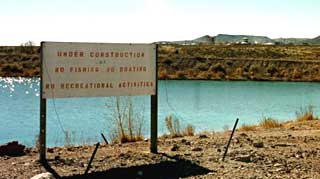 A pond near the firing range. No construction
is anywhere to be seen, but the sign says: A pond near the firing range. No construction
is anywhere to be seen, but the sign says:
UNDER CONSTRUCTION NO FISHING, NO BOATING NO RECREATIONAL ACTIVITIES. (Socorro, New Mexico) |
| Denial of Atmospheric Firing Tanks not used as targets |
The New Mexico Institute of Mining and Technology
(commonly called New Mexico Tech) is on the
west end of Socorro City. From the outer
edge of the campus you can see the mountain
firing range used by the university-owned
and operated Energetic Materials Research
Test Center (EMRTC).
![]() Munitions company testing
Munitions company testing
"Welcome." Vice president Van Romero
(44) extends his large hand. We're in a room
on the second floor of Brown Hall. He is
dressed casually in jeans and sneakers. His
manner is friendly and open, but when he
sees the camera I put on the table, he says,
"Please don't take my picture. Here
at New Mexico Tech most of our work involves
anti-terrorist measures. I can't do anything
that might advertise my face to terrorists."
The university was founded in 1893 to teach
and study mining and the extraction of mineral
resources. During World War II, however,
the focus changed to weapons development.
Now, of 140 faculty members, 100 work for
the EMRTC Division, which is involved in
the research and development of missile warheads
and other weapons. New Mexico Tech has about
1,500 students.
The firing range of about 8,000 hectares
is used to test the weapons developed by
the university and by the Defense Department
and munitions factories.
"Research related to depleted uranium
munitions accounts for less than 5% of our
total research. Most of the testing is of
munitions brought here by the army or Aerojet
or other manufacturing companies."
![]() Forty tons in more than twenty years
Forty tons in more than twenty years
Between the start of DU testing in 1972 and
1993, EMRTC says it used about 40 tons of
DU. When I asked if the DU rounds were fired
at old tanks or used in unshielded open-air
tests, Romero flatly denied both. "We
have never used a tank as a target. And in
testing DU penetrators, we have always used
a catch box for shielding, right from the
beginning."
According to his explanation, a catch box
is made of wood and packed with sand. A plate
of lead, iron or other metal is then placed
in the box as the target for the DU penetrator.
Romero says this method seals the DU particles
in the sand and keeps them from scattering
into the air, which would pose the greatest
health threat.
I pointed out the difficulty of obtaining
data about levels of destructive power without
firing at a real target. Romero answered
with complete confidence, drawing on a white
board to illustrate his points. "A target
like a tank is too complicated. Scientists
want to know how effective a DU round is
against a certain substance. This is sufficient.
Besides, in our so-called open-air tests,
the term "open-air" refers only
to the flight course from the tank or gun
that fires the shell to the catch box. It
does not imply an unshielded open-air shot."
If so, then EMRTC's use of this term differs
from that of other similar facilities in
the US.
![]() No answer about the present situation
No answer about the present situation
Romero says that the university and the state
Environmental Protection Department, which
has a "surveillance role," have
frequently monitored environmental contamination
from DU on the firing range and in Socorro
City. "We have found no evidence of
DU release into the environment, even at
the firing range. We find no heavy metal
contamination whatsoever."
The university is presently working to improve
the wire-guided "tow missile,"
a weapon fired from a tank cannon that pulls
with it a wire conductor. Some believe that
these weapons have DU warheads. Romero refused
to give me a clear answer, "I don't
know about other facilities, but we are not
using them here. I am not at liberty to tell
you the substance we use."
Turning the subject away from DU, Romero
began to tell me about various anti-terrorist
measures. His business card is inscribed
with the university slogan, "THINKING
FOR THE NEW MILLENNIUM." I shudder to
think of what they will come up with.